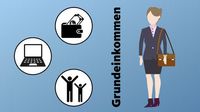In a groundbreaking study conducted in Germany, the concept of unconditional basic income (UBI) has been put to the test, revealing surprising results that challenge long-held beliefs about welfare and work incentives. From June 2021 to May 2024, 122 participants received a monthly payment of 1,200 euros without any conditions, as part of a long-term study led by the association "Mein Grundeinkommen" and supported by various economic institutions. The results, presented on April 9, 2025, indicate that recipients did not reduce their working hours compared to a control group, contradicting fears that such financial support would discourage work.
Jürgen Schupp, a researcher at the German Institute for Economic Research (DIW Berlin) and the study's lead, emphasized that the findings contribute to a more evidence-based discussion about the narrative surrounding basic income. "The BGE does not lead to self-imposed unemployment," he stated, highlighting that the proportion of unemployed individuals in the basic income group was nearly identical to that of the comparison group.
This study, which involved nearly 1,700 participants, primarily focused on employed individuals aged 21 to 40 with a net monthly income between 1,100 and 2,600 euros. The results revealed that not only did participants maintain their employment levels, but many also reported improved mental health, higher life satisfaction, and a greater sense of autonomy.
Among the participants was Romy, a 34-year-old psychologist from Leipzig, who shared her experience of how the basic income allowed her to pursue her artistic ambitions. "With the basic income, I was able to initiate a part-time self-employment as an artist," she explained, noting that it provided her with the financial cushion to take a professional break and focus on her passion for painting.
Interestingly, the study found that the basic income recipients engaged more in further education and were generally more satisfied with their professional lives. One participant, Bianca Radlbeck, utilized the funds to afford living expenses while studying in Munich, allowing her to focus on her education without the stress of financial instability.
Overall, the study indicated that participants spent nearly four hours more per week socializing compared to those without basic income. This increase in social interaction contributed to better overall well-being, with many reporting reduced stress and improved sleep quality.
Furthermore, the research revealed that more than a third of the basic income funds were saved, while about half was spent on consumption, including travel and support for friends and family. Participants also donated an average of 125 euros per month to charitable causes, demonstrating a sense of community and generosity.
Despite the positive findings, the study has faced criticism, particularly from the Institute of the German Economy (IW), which questioned the validity of drawing broad economic conclusions from a sample size of just 107 participants in the evaluation. Critics argue that the participants were not typical welfare recipients but rather individuals who won a lottery-like selection for the study, which may skew their behavior and attitudes towards the basic income.
In response to these critiques, Klara Simon, chairperson of "Mein Grundeinkommen," argued that the unconditional basic income could lead to significant savings in health and social systems by promoting mental stability and productivity. She emphasized the potential of UBI to address growing social inequality in Germany, stating, "It can be an effective tool against the increasing social inequality in this country, which is currently undermining our democracy from within."
Financial feasibility remains a hot topic in the UBI debate. The association developed an online financing calculator that suggests that 83% of the population would financially benefit from a basic income, with only 10% needing to contribute more. The proposed financing methods include a moderate tax mix, raising income taxes, and eliminating certain tax privileges.
As the discussion around UBI continues, the findings from this study could reshape the debate in both political and social spheres. Schupp expressed hope that the results would encourage more fact-based discussions about the viability of UBI in Germany, urging policymakers to consider the evidence rather than relying solely on assumptions.
Looking ahead, "Mein Grundeinkommen" plans to conduct further analyses and will be offering another round of unconditional basic income lotteries on May 1, 2025, aiming to distribute around half a million euros. The growing interest in UBI, particularly in light of these findings, suggests that the conversation around this innovative social policy is far from over.
In a climate where economic stability and social well-being are increasingly prioritized, the implications of this study could resonate well beyond Germany, potentially influencing similar discussions worldwide. As more people advocate for economic reforms that prioritize human dignity and financial security, the basic income model may pave the way for a new understanding of work, welfare, and community support.









